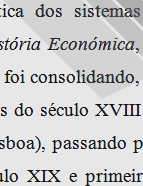

................................
Despite the author's intention, this economic history is closely intertwined with political history, even in its temporal framework, and based on the chronology of the respective reigns. Regarding its value in the context of Portuguese historiography, the following appraisal is worthy of note: "Such a study does not rely on archival research, does not innovate in method, is somewhat irregular in information detail, and follows a clear ideological purpose to justify doctrines dear to the author, namely his favourable stance on free trade. Nonetheless, it has the merit of exploring an understudied field in Portuguese historiography and the originality of seeking to demonstrate [...] that the Methuen Treaty was an important moment for the progress of the Portuguese economy and not a crucial moment for explaining its industrial backwardness" (Carlos Bastien, "Francisco António Correia (1877-1934)," 2001, p. 95). Another notable figure towards the end of the period under review was João Lúcio de Azevedo (1855-1933). After attending primary school in Mafra and completing his preparatory studies at the Colégio do Sérvulo, he entered the Aula do Comércio in Lisbon, where he completed the course. At the age of 18, he emigrated to Brazil, settling in Belém do Pará, where he worked in a bookshop, eventually becoming its owner and marrying the daughter of the owner. The education he received from the Aula do Comércio, his contact with books and passion for them paved the way for the publication of his first work (Estudos da História Paraense [Studies on the History of Belém do Pará] 1893). The publication of this work earned him membership in the Brazilian Historical and Geographical Institute (1894). Having sold his business, he returned to Portugal (1900), sufficiently financially secure to dedicate himself exclusively to intellectual pursuits. He lived in Paris, improved and learned languages (French, English, Dutch, Italian, and German), and interacted with some of the leading figures in Portuguese historiography of the time—Gama Barros, Costa Lobo, Braancamp Freire, David Lopes, Edgar Prestage, Luciano Pereira da Silva, Oliveira Lima, and Joaquim Bensaúde (Maria A. S. de Azevedo, "Azevedo, João Lúcio de (1855-1933)," 1963, p. 264). From his vast body of work, the following may be highlighted: O Marquês de Pombal e a sua época [The Marquis of Pombal and his time] (1909); História dos cristãos novos portugueses [History of the Portuguese New Christians] (1922); Épocas de Portugal Económico. Esboços de História [Periods of Economic Portugal. Sketches of History] (1929); and Organização económica [Economic Organisation] (História de Portugal, under Damião Peres, vols. II, III, and V, 1929-1933).
